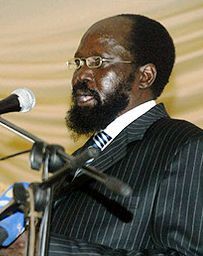South Sudan forms autonomous government after deal
Oct 23, 2005 (KHARTOUM) — South Sudan has formed an autonomous government as part of a January peace deal that ended more than two decades of civil war in Africa’s largest country, a senior official said on Sunday.
 The former southern rebel Sudan People’s Liberation Movement (SPLM) signed the deal with the Islamist northern government to set up a federal system, wealth sharing, transition to democracy and a referendum on southern secession after six years.
The former southern rebel Sudan People’s Liberation Movement (SPLM) signed the deal with the Islamist northern government to set up a federal system, wealth sharing, transition to democracy and a referendum on southern secession after six years.
“It was formed yesterday (Saturday) evening and is composed of about 20 ministers,” SPLM spokesman Walid Hamid said.
The government includes a ministry for the wife of former SPLM leader John Garang, who was killed in a helicopter crash three weeks after taking office as first vice president in what many saw as a setback to the peace process.
Garang’s wife Rebecca, praised for her public steadfastness following his death, has won the ministry for roads and transport that commands a large budget to build infrastructure in the devastated south where there are few tarmac roads.
Under the deal the SPLM dominates the southern government, taking 70 percent of ministries, with the ruling northern party the National Congress Party (NCP) and other southern forces each taking 15 percent.
The southern government will begin work immediately, Hamid said, and will sit in the southern capital Juba. It will run the affairs of the south, which has its own army and banking system.
But Hamid said implementation of the agreement was not running smoothly and the two parties had reached an impasse over the administration of Khartoum state, which includes the national capital and millions of northerners and southerners.
“We could not reach any understanding,” Hamid said. “We differed on the basic definition of Khartoum — they call it a northern state, we say it’s the national capital,” he added.
The civil war claimed 2 million lives, mostly from famine and disease and forced more than 4 million from their homes.
It broadly pitted the mostly southern and animist rebels against the Khartoum-based government, but was complicated by issues of oil, ethnicity and ideology.
The southern deal does not cover a conflict in Sudan’s western Darfur region, or a smaller rebellion in the east.
(Reuters)
